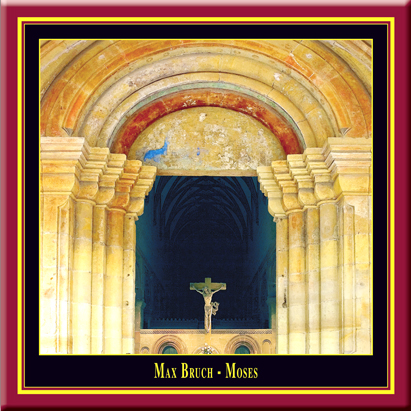 |
 |
|
Max Bruch (1838-1920) Peter Lika Kantorei Maulbronn A concert recording from the minster 2-CD-Box, DDD, c. 120 minutes |
|
|
|
The concert performance at the church of Maulbronn Monastery
Conducted by Bruch, the debut performance was finally held on the 8th of January 1895 in Barmen. It is a piece of early oratorical art that Bruch has created here, yet one that is cloaked in the era of the Late Romantic. The choir is the decisive mediator of events in the piece of work. In addition to delicate poetic expression, the dramatic impact also demands particularly creative agility and adaptation from the singers. Even Bruch's contemporaries were suspicious of the opus. In June 1895, Johannes Brahms wrote to Clara Schumann: "Bruch has now published a Moses... If only one could feel a hint of joy in the stuff! They are weaker and worse than his own early works in every respect. The only good sentiment is when one feels inclined, as I do, to thank the Lord that he spared us of the sin, the vice, or the bad habit of mere score-writing." Bruch, on the other hand, saw himself affirmed in his work and wrote to his publisher Franz Simrock in February of 1895: „I want to tell you a secret: noble and ample effects on thousands are not to be attained by common means; something higher, which cannot be defined, is working from within the productive artiste... I could have not have written ‘Moses' had not a strong and deep feeling of divinity been alive in my soul, and every deeply insightful artiste will have experienced that once in his life, so that through the medium of his art, he can proclaim to the people the best and innermost emotions of his soul... And in such, Moses proved to the world that I did not stand still – as that is the most potent danger in older age." The oratorio so powerful and atmospheric in its choruses and arias consists of two parts and presents four episodes from the life of the prophet Moses. Part one of the opus begins with a short, dramatic introduction. The scene At Sinai depicts Moses as the leader of the Israelites. He is called to the mountain by an angel to receive the Ten Commandments from Jehovah. During his absence, his brother Aaron is designated as keeper of the people. The Sanctus beginning with Psalm 90 of both solo parts of Moses and Aaron in alternation with the people was a core part of the opus for Bruch. In the second scene, The Golden Calf, the plot makes a wide bend, heading towards the oratorio's tragic conflict, the Israelites' digression from Jehovah. Three impulsively scored chorus scenes portray the chosen people's restlessness and doubt caused by the prophet's long absence. The crude demand made of Aaron to produce a golden calf as a visible idol culminates in the anger of Moses, who has returned and calls to order the Israelites who are dancing around the false god Baal. Part two (episode three), The Return of the Scouts from Canaan, begins in the middle of the conflict between Moses and the Israelites. The scouts Moses has sent to the Promised Land bring back hymnic reports of the "land of dreams", but the prophet deems the people of Israel unworthy of the Promised Land. Aaron and the Israelites arrive at deeper insight: "oh Lord, help us find mercy". A depiction of the fight with the Amalekites then follows. In the last episode, The Promised Land, the Lord's angel proclaims to Moses his approaching end. The prophet leads his people to the Nebo Mountain where a view of Canaan is granted. Moses blesses the Israelites here before he passes away.
|
|
Artists
Birgitte Christensen (Soprano ~ Angel of the Lord)
Stefan Vinke (Tenor ~ Aaron)
Russian Chamber Philharmonic St. Petersburg The Kantorei Maulbronn
|
|
Kantorei Maulbronn Soprano: Altus: Tenor: Bass: |